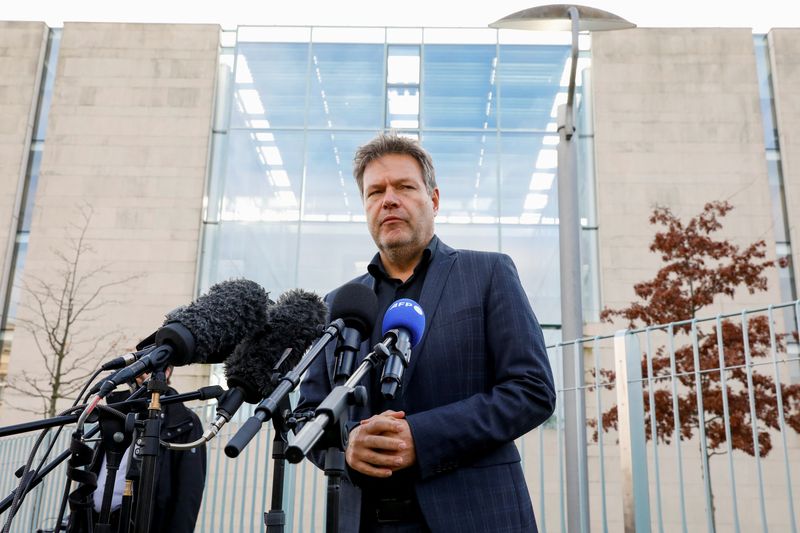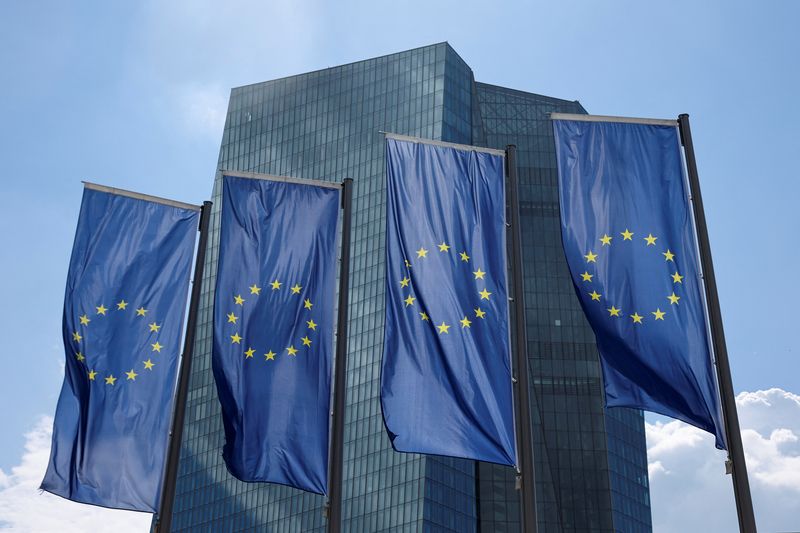By John O'Donnell and Christoph Steitz
FRANKFURT (Reuters) -The European Central Bank is examining the use of derivatives by energy companies to make huge bets on future power and fuel prices, to see if such activity poses a wider risk to financial stability, three people familiar with the matter said.
Two of the people said the inquiry was prompted by Germany's rescue of top gas importer Uniper, which like other energy firms hedged its exposures with derivatives worth tens of billions of euros, far outstripping the value of the energy it sold.
The ECB's move is the first major effort in Europe to identify whether the use of derivatives by power companies poses a wider financial threat, and exposes the largely unregulated trading, which totals trillions of euros, to rare scrutiny.
One of the people said ECB officials had initially been concerned that energy companies were acting as de facto traders but without the regulatory oversight applied to banks, which are required to hold cash buffers against potential losses.
But there was also a wider question for the officials: could the energy companies' use of such complex instruments threaten financial stability?
So the ECB has widened its scrutiny to examine potential domino effects, including on the banks which it supervises.
The ECB, the euro zone's primary financial authority and guarantor of financial stability, declined to comment. It will outline some of its findings in the coming days, two of the people said.
One of the people said derivatives posed a risk because of the regular demands for lodging cash security to underpin trades, so that trading by energy firms could also damage banks.
ECB officials have discussed Uniper's use of derivatives, two of the people said, and whether that compounded its problems when Moscow turned off gas supplied to Germany through the company in response to Western sanctions over Russia's invasion of Ukraine.
Earlier this month, Uniper revealed a 40 billion euro ($39 billion) loss for the first nine months of this year, the biggest in German corporate history.
As gas prices soared this year, some traders and banks lobbied the ECB to help brokers and clearing houses, as they grappled with a liquidity crunch that Equinor, Europe's top gas trader, estimated at 1.5 trillion euros. [L8N30P09R]
While ECB President Christine Lagarde said the ECB stood ready to provide liquidity to banks, she said it would not do the same for energy firms.
However, central banks could, indirectly, be left on the hook as they act as a lender of last resort, said one person, meaning they could extend credit to banks, who would then lend on to energy companies to cover trades.
Germany's financial regulator BaFin said that the risks in derivatives trading by energy companies has long been under scrutiny and warned that any such company that had not applied for the relevant financial licence was breaking the law.
"Energy companies pose specific risks not only to financial stability. They are often also of systemic importance for the economy as a whole," a BaFin spokesperson said.
"We are therefore in close dialogue with energy supervisors to address all kinds of risks," the spokesperson added.
Policymakers in Brussels are also concerned and circulated a paper this week suggesting extending tough rules applied to banks to energy firms that trade derivatives.
In the document seen by Reuters, they say applying stricter controls would prevent "that risks spread from the real economy to the financial sector".
MARGIN CALLS
Energy companies are known for buying and selling oil, gas and electricity rather than trading derivatives, such as an option to buy or sell gas at a fixed price in the future.
They say derivatives are chiefly to hedge or protect themselves against swings in prices. If the market price falls far short of or soars past an option price, the cost of keeping this trade can jump for both sellers and buyers.
To ensure that deals are not derailed by price movements, traders lodge security, often cash, with clearing houses processing the deals. With recent price spikes, the demands for such 'margin calls' rocketed.
A Uniper spokesperson said its problems resulted from the spike in gas prices, which determined the cost of its rescue.
But Uniper's financial statements gave a glimpse of the scale of losses linked to derivatives as prices gyrated.
The company said it had made a series of writedowns and adjustments, including a 3 billion euro writedown on derivatives and a 9 billion euro loss from derivatives used for hedging.
Uniper said there had been an 11 billion euro impact on profit from 'remaining derivatives', something a spokesperson told Reuters was due to accounting rules, declining to outline the overall impact of derivatives.
Germany's economy ministry, which is finalising Uniper's nationalisation, said it could not comment on its business risks.
Rating agency Moody's (NYSE:MCO), meanwhile, said that energy companies did not provide enough information about their derivatives.
"We are struggling to identify precisely what is linked to operational activities and what is linked to speculative trading," Knut Slatten, a credit analyst, told Reuters in comments on companies across the sector.
In a recent report on derivatives, Moody's addressed Uniper's case but also criticised RWE and E.ON.

"You rarely find information about counterparties. You can't really find much information about how long these hedges last for," Slatten said.
E.ON said it was transparent. RWE said its rating with Moody's was stable and that it was in contact about the impact of the Ukraine crisis, declining to give details of its hedging.
